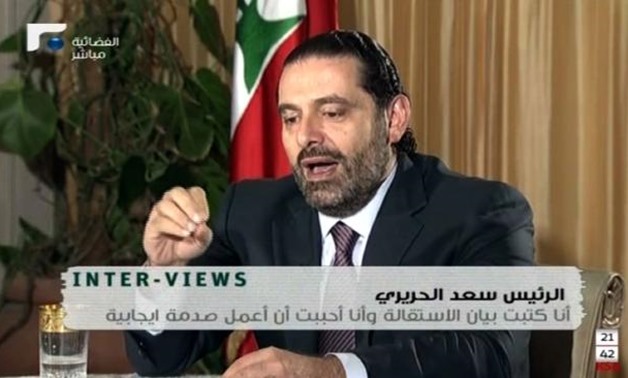
An image grab taken from the Hariri family-owned Lebanese channel, Future TV, shows Lebanon's resigned prime minister Saad Hariri speaking during an interview from Riyadh- AFP
CAIRO – 19 November 2017: “The interview with Premier Saad Al-Hariri was broadcasted on air,” said Lebanese anchorwoman Paula Yacoubian to Egyptian anchor Amr Adeeb on ON-E TV on November 12.
She revealed that Hariri had not minded answering all her questions, adding that she did not meet with any Saudi national at Hariri’s house where the interview was conducted – “only Hariri’s family living in Riyadh.”
“I was on my way to Abu Dhabi on a private work trip not related to journalism, and when I arrived, I learned that PM Hariri had tried to contact me. I called him back and he told me, ‘You’ve been seeking a live interview for some time now. You can come now’,” added Yacoubian.
“I said ‘sure’ and this is how it happened,” she told Lebanon-based An-Nahar newspaper.
Al-Jadeed television meanwhile reported that “Saudi authorities have not allowed Future TV’s crew to accompany Yacoubian.”
Hariri said during the interview that he planned to return to Lebanon to confirm his resignation in accordance with the constitution. But he also said that if he rescinds his decision to quit, the Hezbollah movement must respect Lebanon's policy of staying out of regional conflicts.
On November 4, the 47-year-old Lebanese Sunni politician unexpectedly declared his resignation in a pre-recorded message during his visit to Riyadh. He said in the televised speech that he feared for his life and accused Iran and its proxies of destabilizing his country and the region. Hariri’s resignation has raised regional and international controversy, threatening of a political crisis in Lebanon.
Hariri described his decision to resign as a necessary move to “cause a positive shock” to the Lebanese political scene, warning against what he said was Iranian interference that is ruining relations with other Arab countries.
Hariri served as prime minister from 2009 to 2011 and took office again in 2016.
Lebanon President Michel Aoun said before the interview that the “mysterious circumstances for Hariri’s stay in the Saudi capital of Riyadh makes all his positions questionable and in doubt and not of his own volition.”
Saudi Arabia, the United Arab Emirates, Kuwait and Bahrain have issued last week advisories to their citizens about traveling to Lebanon and urged those who are in the country to leave as soon as possible.
They warned would-be Lebanon visitors about “safety considerations."
In 2016, Bahrain, Saudi Arabia, the UAE and Kuwait had ordered their nationals to leave Lebanon after they considered that Hezbollah, the armed group fighting in Syria alongside the regime, controls Lebanon's political leadership. The UAE has not lifted its travel bans on Lebanon since then.

Comments
Leave a Comment